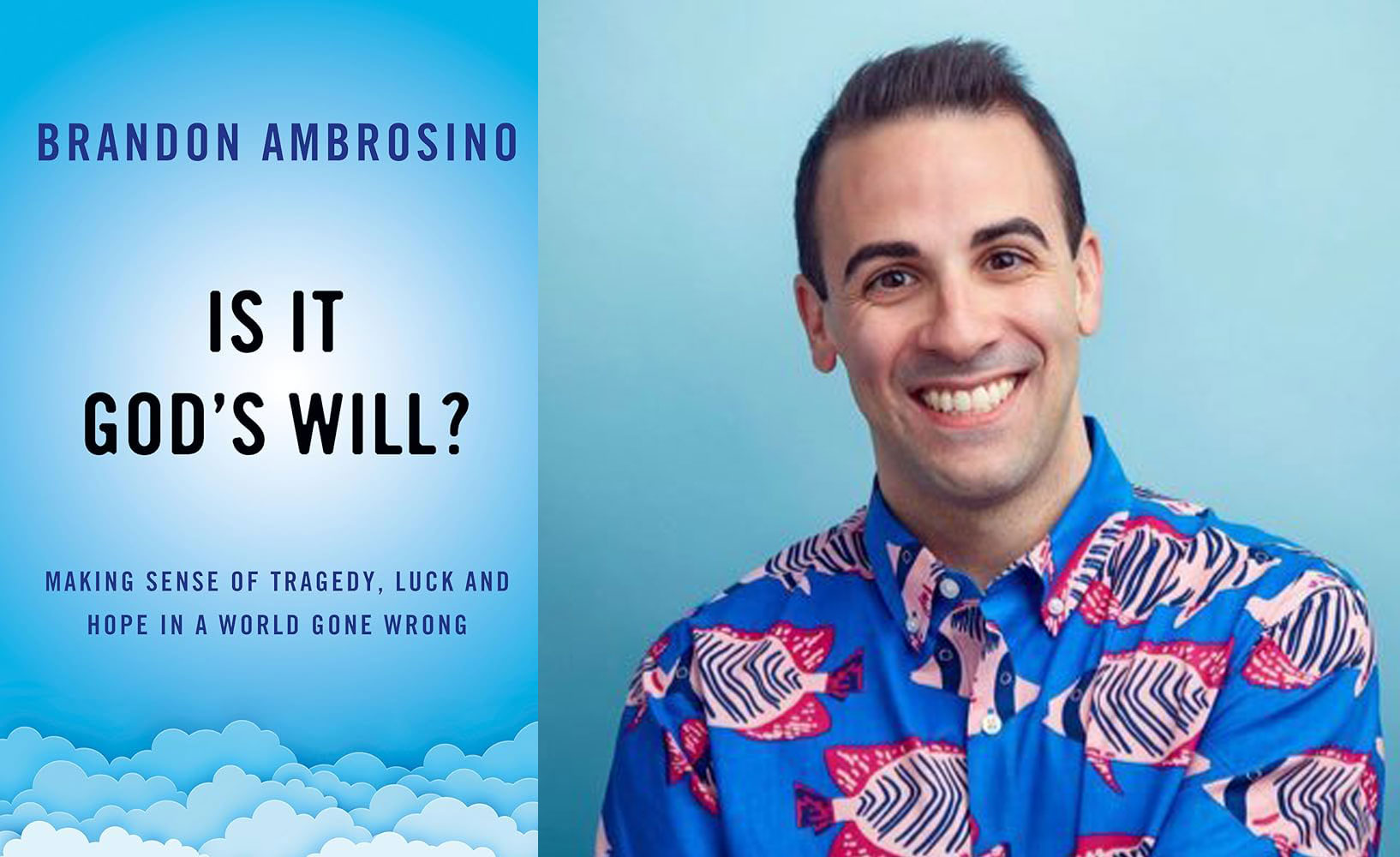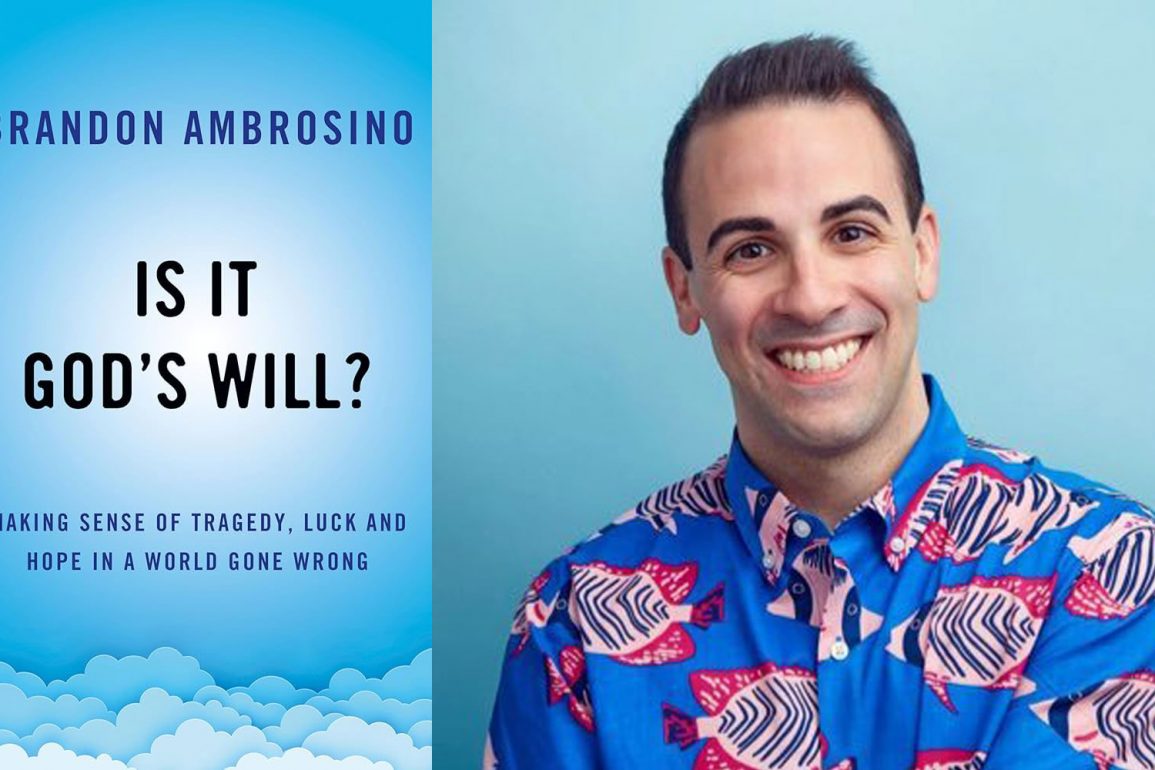
(RNS) — Two events conspired last summer to convince Brandon Ambrosino to write a book on theodicy, or why God allows evil.
In July, Donald Trump survived an assassination attempt at which a local firefighter was killed. The event sparked a national conversation that asked whether Trump’s survival meant he was favored by God.
A month later, a good friend of Ambrosino’s died of a heart attack at age 44, leaving behind a wife and two young children.
The result is a new book, “Is it God’s Will? Making Sense of Tragedy, Luck and Hope in a World Gone Wrong.” In it, Ambrosino grapples with the age-old question of why God allows bad things to happen to good people.
Raised in the Church of God, Ambrosino has written about his experience coming out as gay as a student at conservative Christian Liberty University and later worked as a dancer, a university instructor and a journalist, publishing in The New York Times, The Atlantic and The Economist, among outlets (including this one). Recently, Ambrosino earned a Ph.D. in theology and ethics from Villanova University.
In his new book, he is in full theologian mode, investigating questions of God’s omnipotence and omniscience. He comes to some frank and candid admissions about the nature of God that may discomfit some readers. He ends up proposing that God is a prompt who sustains the world by pushing it toward love and hope.
RNS spoke to Ambrosino, who is now teaching theology at Villanova while pursuing a master’s degree in bioethics at Loyola University in Chicago. The interview was edited for length and clarity.
What led you to turn from journalism to theology?
Part of it was circumstantial. When I moved to Delaware (where his husband is a dentist), I was doing a lot of religion reporting, and I also started doing some analysis and some opinion pieces, but I realized my only theological training was from Liberty. So I thought it might be in my best interest to branch out. So I took a Catholic ethics class at Villanova, and I just fell in love with the campus. But then what kept me there were the people.
You grew up Pentecostal; what is your faith tradition now?
I grew up in the Church of God, in Cleveland, Tennessee. Liberty was Baptist, so I was educated in Baptist theology, and spent time in the evangelical world. After I left Liberty, I started worshipping at an Episcopal church. And then one time the priest said something that I disagreed with, and I remember reaching out to Father James Martin, and I said, ‘I think it’s time for me to go to a Catholic church.’ And he said, ‘Yeah. I think it’s time.’ Then when I went to Villanova, I think that really sealed the deal. I just really loved the Augustinians there, and so I ended up getting confirmed as a Catholic in December 2017.
You dedicate the book to your godchildren, who lost their father at a very young age. Was that the impetus for writing a book?
I wrote the book under the enormous weight of Carl’s loss. Andy (my husband) and I were driving home from vacation and we got the call that he had just suddenly died of a heart attack. He had just turned 44 years old. And so we drove straight to the Philly airport and flew down to Orlando to be with his wife and our two goddaughters who at the time were 10 months old and 2. And I remember having a conversation with my beautiful 2-year-old goddaughter, telling her daddy wasn’t coming home, and that really affected me.
(A month earlier) President Trump was almost assassinated, and a lot of Christian Trump supporters were saying that God saved Trump’s life. And it really troubled me because I thought, if God saved Trump’s life, in a way that resulted in a firefighter’s death, then that’s really bad. And so it just got me thinking. So I wrote this piece for the Christian Century, and an editor saw it, and he got in touch with me and asked if I was interested in writing a book on this.
The God you present here is not the one that many people meet in church. It’s a God that’s not omnipotent, not omniscient. God is a kind of relational force, a kind of an invitation, in the direction of love. Is that how you view it?
I view God as the one who provokes us to hope. A lot of people might have trouble believing in the kind of God I’m presenting. And I totally get that. It’s difficult to say, I believe in a God who doesn’t know the future. But for me, I reached a point where believing in a God who knows the future and who is powerful enough to prevent it, but doesn’t prevent it, that just became unthinkable.
If God knew Carl was going to drop dead but, but didn’t intervene — why didn’t God intervene at that point? The response is, well, God had a plan here. God had something he wanted to teach Carl’s wife and children. I just can’t accept any of those questions. So, while I understand it’s difficult to believe in a God who doesn’t know the future, it’s more difficult for me to believe in a God who knows the future and allows it to play out.
Some people might read your book and say, here’s proof I should be an atheist.
So yesterday I was teaching, and I brought up the shooting that happened at the Catholic school (in Minneapolis). How do we square that with the fact that this 8-year-old was murdered yesterday in a church? What, what kind of God allows this to happen? For me, what’s comforting about God is that God is with us in these moments of loss. God is feeling every bit of sorrow and grief that we are. God is close to the brokenhearted. He heals the brokenhearted and binds up their wounds. That to me is a believable God. God does have power, but his power consists in the ability to constantly provoke us to hope in the wake of devastating tragedy.
I don’t understand what explains this hope. I mean, we are facing global crises right now. We don’t have much reason to hope, yet many of us still feel hopeful for the future. I believe we’re hopeful because God provokes us to hope. God is powerful enough to provoke us to keep hoping for a future of love and justice, despite the painful evidence to the contrary.
You describe your theology as theopoetic. Explain that.
One of the people who have popularized this field is Jack Caputo, one of my mentors at Villanova, but certainly some other writers, like Catherine Keller, really popularized this. Theopoetics begins with a skepticism about the logos in theology. The logos in theology is this obsession with logic and order and systematization, where everything is perfectly coherent. At least for me, I don’t really find a lot of systematic theology in the Hebrew and Christian Scriptures, but what I find are poetics. I find people entering into conversations with each other and God as they grapple with the messiness of their everyday lives.
Many times there is nothing systematic about this. We get a diversity of theologies. We can’t even make it through the first two chapters of the Bible without getting two different stories of how creation happened. So it’s not systematic; it’s a lot more poetic.
Has being gay helped shape your theology?
It’s not necessarily that I’m doing theology about LGBTQ+ issues, it’s that I’m doing theology queerly. To me, systematic theology is a very straight discipline. It takes itself very seriously. It’s very authoritative. And I think what the best of the queer tradition has always practiced was, what one scholar refers to as “taking the terror out of error.” So, maybe some of my conclusions are wrong in this book, but I’m not afraid of that. A lot of the theological ideas that shaped us, especially in this country, have dead-ended in white nationalism, Christian nationalism, various supremacies, various practices of exclusion. That’s why I just want to explore where can we take this in the future.
I think because I could never pass as a so-called serious straight theologian, I just never even tried. I feel freedom from trying to conform to these structures because just by virtue of who I am, I can’t conform to them. So maybe I’m not doing perfectly academic theology, but I hope that what I’m doing is being Brandon.








